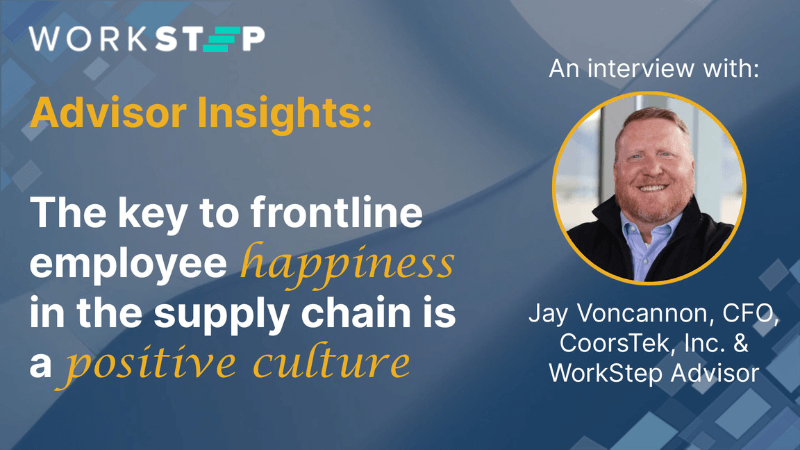The key to frontline employee happiness is a positive company culture
September 13, 2023
“Company culture is extremely important because it is the one area in which all members of the organization can get behind and move toward.” – Jay Voncannon
When it comes to staying ahead in the competitive manufacturing sector, leaders tend to focus on technology and processes as the primary drivers of success. While these elements undoubtedly contribute, the real differentiator lies in cultivating a supportive company culture. Jay Voncannon, the Chief Financial Officer at CoorsTek, Inc. shares how he’s helped foster a high performance company culture through employee engagement and leadership connection.
Refuting the notion that company culture is merely superficial, Voncannon underscores its pivotal role in setting organizations apart. He believes managing and nurturing culture significantly influences employee engagement, performance, and tenure. Company culture is even more important in manufacturing, where organizations seek to distinguish themselves through their workforce.
Company culture is not just a feel-good factor of an organization but a key competitive differentiator.
It’s more clear than ever that the way an organization manages its culture has an effect on employee engagement, performance and success. In manufacturing, this is particularly pronounced as businesses are trying to both appeal to workers in a candidate-friendly labor market and differentiate themselves from their competitors. Employee engagement is one of the most important aspects of company culture when it comes to creating a high-performing manufacturing organization. According to research from Gallup, active disengagement – having employees who are actively disengaged or unhappy – costs organizations up to $550 billion per year in lost productivity. Therefore, it’s essential for organizations to create a corporate culture which encourages employees to remain engaged, motivated, and feeling connected to the greater mission. This can be done by implementing measures such as leadership training, performance incentives, and fostering an “owner mindset” where even frontline employees are empowered to lead as any stakeholder would.
Voncannon encourages the organization to treat employees as family members. CoorsTek’s culture is rooted in shared accountability and a deep respect for the individual. He states, “I try to get people to act like an owner. If you are acting like an owner instead of just an employee, you tend to put in a little more thought and you have a little more emphasis on your decision making.”
The success of Voncannon’s approach stems from the following:
- Authentic Leadership: A good leader will set clear expectations of what’s expected from employees and provide guidance and support when needed. Good leaders encourage open dialogue between teammates and create an environment where everyone feels comfortable expressing their opinion without fear of repercussions or criticism.
- Rewards and Recognition: Performance incentives can be used to reward hard work and dedication amongst employees, encouraging them to go above and beyond their job role in order to reach specific goals or targets set by management. Incentives could be anything from financial bonuses to extra holidays and paid time off, all with the aim of motivating employees and creating a productive environment that promotes excellence.
- Thoughtful Benefits: Benefits play a significant role in ensuring that organizations foster employee loyalty and commitment. Benefits could include healthcare, pension plans, or flexible working arrangements which help create job satisfaction among employees by allowing them time for personal pursuits; ultimately boosting morale and enhancing productivity levels across teams.
Voncannon highlights the importance of standing behind a well-defined company culture, “the worst thing that can happen is if you have a stated culture, but the real culture behind that which exists within your company betrays that stated culture.” He explains that when a company’s culture is embedded in a way that decision-making is driven by it, the company gains a significant advantage over its competitors.
Authentic leadership and consistent communication are key to fostering a high-performing workforce.
In manufacturing, authentic leadership and frequent communication hold the keys to a high-performing workforce. Leaders must embody authenticity in order to create an environment conducive to risk-taking and idea-sharing. Effective communication – both formal and informal – is indispensable. Clear directives, feedback, and respect for diverse opinions, backgrounds, and responsibilities empower teams to excel.
It’s this authentic leadership and constant communication that Voncannon credits his success in building a high performing workforce to. He stresses the importance of genuine leaders who regularly engage with their team members to understand their motivations and create alignment with the company’s goals.
Voncannon’s philosophy boils down to this, “if you don’t understand your own gaps or especially your team’s gaps, then you won’t know how to go fix it or how to fill it in.” He encourages leaders to be self-aware and open to criticism. He believes that understanding one’s own knowledge gaps is essential for effective leadership. The mark of a great leader is being open to having their ideas challenged and course-correcting based on open collaboration at all levels.
This approach allows employees to identify areas of opportunity within the company’s processes or products and rewards them for acting on those suggestions. Top-down support helps build confidence among team members and encourages them to take initiative in driving progress forward.
Great leaders model ethical behavior at all times by upholding the company’s values and standards while staying true to their own personal beliefs. In doing so, they establish a strong sense of integrity within the organization and an environment where individual employees are encouraged to make decisions based on what’s right rather than what’s easy or profitable in the short term.
According to Voncannon, regular communication and engagement with the workforce also helps to ensure that everyone is on the same page with the company’s mission and direction.
Optimizing compensation and benefits to incentivize high performance is crucial for employee retention.
Organizations require compensation and benefits that match industry benchmarks in order to drive performance. Competitive salaries, attractive benefits, and well-defined performance incentives collectively form the crux of a successful performance strategy. It’s not enough to attract and retain top talent, the goal is also to create an environment where that talent can thrive long-term.
Voncannon employs this strategy successfully at CoorsTek by offering base salaries that meet market standards and rewarding high performers through incentive pay programs and performance-based bonuses. “We want to go above and beyond for our high performers and people who are excessively contributing and pay them on top of that. So they are in essence being paid above market,” he states.
Organizations need to understand the standards of their industry when it comes to compensation and benefits in order to be competitive. This means researching the salaries offered for similar positions as well as staying on top of changing benefits trends, like flexible working hours. Organizations should also consider offering perks that will make their organization stand out from the competition.
Voncannon emphasizes the importance of being transparent and honest with employees about the parameters of their compensation and benefits. Voncannon sees this transparency as another form of respect granted to the employees.
In addition to offering competitive salaries and attractive benefits, performance incentives are key for motivating employees. These incentives could come in the form of bonuses or other financial rewards for meeting certain goals or benchmarks. Performance incentives can also focus on non-financial rewards such as recognition or awards for outstanding achievements that contribute towards organizational success. It’s important that these performance incentives are clearly communicated so that all employees understand what is expected of them and how they can achieve these goals.
The value of company culture is undeniable.
As Jay Voncannon aptly demonstrates through his leadership at CoorsTek, Inc., a thriving organizational culture isn’t just a lofty aspiration; it’s a strategic imperative that sets businesses apart in an increasingly competitive landscape. By focusing on authenticity in leadership, effective communication, tailored compensation and benefits, and a commitment to continuous improvement, companies can not only attract and retain top talent but also foster an environment where employees are motivated, engaged, and empowered to drive success.
In the ever-evolving manufacturing world, where adaptability and innovation are paramount, the value of a strong company culture is clear. It’s a compass guiding organizations toward lasting growth and resilience. The responsibility falls upon leaders and decision-makers to champion these principles, realizing that the true strength of any organization lies not just in its technology and processes, but in the hearts and minds of its people, unified by a shared culture and a common vision for a brighter future.
Improve your company culture with WorkStep
With the frontline employee engagement platform that delivers the real-time insights you need to take action, retain your workforce, and drive your business forward.
Tom Goyette, Product Marketing Manager | tom.goyette@workstep.com
Tom Goyette is a Product Marketing Manager at WorkStep. With experience in start-up and enterprise level SaaS and eCommerce organizations, Tom excels at managing and creating content, marketing, and analytics. Tom believes people are at the center of every great organization and is eager to share stories that highlights the value of the employee voice.



